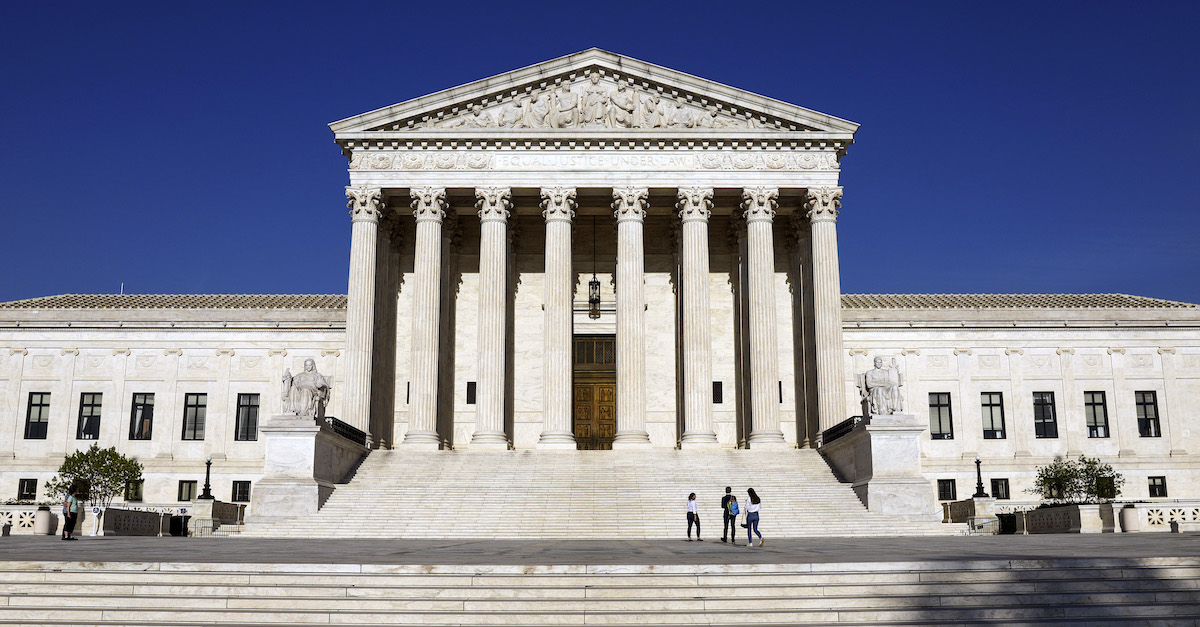
The U.S. Supreme Court
The Supreme Court of the United States ruled 7-2 Monday against a woman in a vegetative state, thereby allowing Florida to recover hundreds of thousands of dollars in settlement funds earmarked for the woman’s medical care following a catastrophic injury when she was a child.
In Gallardo v. Marstiller, the high court affirmed the ruling of the U.S. Court of Appeals for the 11th Circuit and held that Florida may seek reimbursement from settlement amounts representing “payment for medical care,” past or future. The ruling is adverse not only to petitioner Gianinna Gallardo, but also to the position taken by the Biden Administration, which argued in favor of Gallardo’s position as an amicus curiae.
Gallardo was 13 in 2008 when she was hit by a pickup truck after getting off a schoolbus. Gianinna’s tragic injuries placed her in a vegetative state, which she remains in to this day. Gianinna’s parents sued the truck driver, the trucking company, and the school district; ultimately, the case settled for $800,000, and the sum was intended to pay for Gianinna’s past and future medical care.
Over the years since the accident, Florida’s Medicaid agency paid for most of Gianinna’s treatment. The Sunshine State then sought $300,000 of the family’s settlement as reimbursement for past medical expenses. The 11th Circuit allowed Florida to pursue the funds, but through counsel, Gallardo appealed on the basis that other jurisdictions would not have allowed such action.
Primarily at issue was whether the “anti-lien provision” in the Medicaid statute prohibits Florida’s attempt to take over part of the settlement to recover funds paid out for medical expenses.
Justice Clarence Thomas wrote for the 7-member majority, and explained that the Medicare statute already contemplates the situation at hand.
“Rather than permit the State to recover from a beneficiary’s entire settlement, the statute entitles Florida to half a beneficiary’s total recovery,” Thomas explained, noting that attorney’s fees and costs are already deducted from the recoverable amount. This, the court found, creates a presumption that a portion of the tort recovery that is for “past and future medical expenses.”
According to Thomas, the case is conclusively decided by “[t]he plain text” of the applicable Medicaid statute. He reasoned that while the statute does distinguish between settlement funds paid for medical versus non-medical expenses, it makes no similar distinction between payments for past versus future medical care. Thomas dismissed the family’s argument by concluding that it rests on a misreading of the statute.
The majority also addressed the petitioner’s argument that the Medicaid statute’s “anchor” provision limits Florida’s recovery to amounts already paid out for medical care. Thomas wrote that “It would have been easy” for Congress to draft the statute in a way to clarify such a rule. However, Congress did not do so.
Justice Sonia Sotomayor penned a 15-page dissent which was joined by Justice Stephen Breyer. Conspicuously absent from their joint dissent, though, was Justice Elena Kagan. Kagan, who often joins Sotomayor and Breyer in dissent, suggested she might side with Florida during oral arguments when she appeared to reject Gallardo’s lawyer’s assertion that Florida’s statutory interpretation would “lead to absurd results.”
Sotomayor had strong yet polite words for the majority’s analysis. She opined that the statute’s language acknowledges that it would be “fundamentally unjust” for a state agency to “share in damages for which it has provided no compensation.” Despite what the statute sought to avoid, the majority of the high court “permits exactly that,” according to the justice.
Framing the issue rather bluntly, Sotomayor said that the Court now allows states to “reimburse themselves” not just from past Medicaid payouts, but also “for future medical care for which Medicaid has not paid and might never pay.” Such a system, continued the justice, “is inconsistent with the structure of the Medicaid program and will cause needless unfairness and disruption.”
Sotomayor turned to the relevant portions of the Medicaid statute itself, and clarified: “Together, the anti-lien and anti-recovery provisions establish that acceptance of Medicaid does not render a beneficiary indebted to the State or give the State any claim to the beneficiary’s property. In other words, Medicaid is not a loan.” She continued to point out other inconsistencies with the majority’s reasoning. “It would be bizarre,” Sotomayor wrote, for Congress to allow the state to invade a settlement payment while simultaneously limiting the beneficiary’s duty to cooperate only to services paid.
Rather, Sotomayor argued, the only “symmetrical and coherent” conclusion is that the state can recover only for funds already paid out. “This interpretation is also consistent with the structure of the Medicaid program as a whole,” she noted.
She also called the majority’s logic “an implausible workaround” born of an “acontextual reading” of the statute. Sotomayor went on to say that the majority’s analysis “starts off backward,” “contradicts precedent,” and diminishes beneficiaries’ interests in a way that “could perversely cause States to recover fewer overall expenses.” Sotomayor allowed that Congress might wish to intercede and address any further disruption caused by the court’s decision. But the justice said that “under a proper reading of the Act, such intervention would have been unnecessary.”
[Image via Kevin Dietsch/Getty Images]